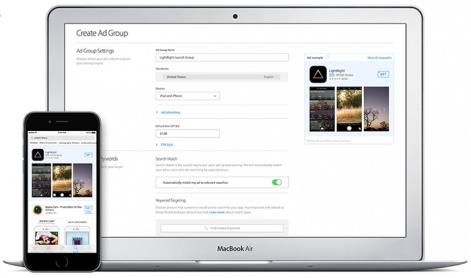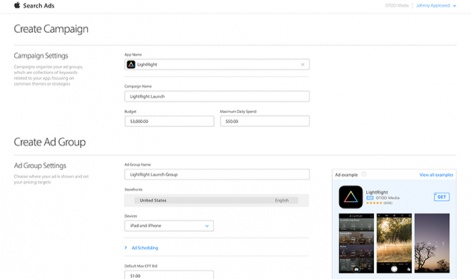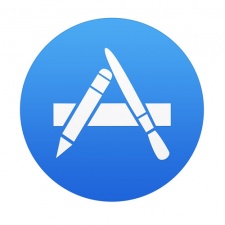Hannah Hastings is the Content and Community Manager at app discovery outfit Tapdaq.
This article originally appeared on the Tapdaq blog.
On Wednesday 8th June, Apple cemented speculation they would introduce paid search ads to the App Store.
Soon, they will let developers pay to have ads for their apps appear at the top of search results.
In its current state, the App Store is broken from a developer's perspective.
Apps are being lost in search results, users are struggling to find what they're looking for and ultimately, developers are missing out on users and revenue.
Apple have made small steps in recent years to improve discovery, such as the introduction of auto complete and trending search. However, Apple's changes still don't fix the problem - here's why.
The 'Big Change'
In short, single paid ads will start appearing at the top of search results in the App Store, initially in the US. The chosen ad will be determined by a price auction, along with a metric determined by Apple.
This is a really controversial move by Apple in a time when App Store discoverability is in turmoil.
With Apple previously ditching iAds in favour of ad free experiences, why have they now decided to introduce 'Search Ads'?
What it means
This announcement is bad news for indie developers.
The addition of Search Ads is a great example of Apple going against what they publicly preach: better discoverability for more developers.
The addition of Search Ads is a great example of Apple going against what they publicly preach: better discoverability for more developers.
As Eric Seufert (Partner at Heracles) said, "search is basically the only way that a small developer without a big marketing budget can be discovered, why would they (Apple) want to take that away from them. If you open up search to being paid for, then you just give the big developers with the big budgets one more way to sort of monopolise discovery."
The winner takes all
It appears Apple have created another opportunity for a winner-takes-all-scenario.
It benefits big developers with big pockets who can outbid everybody else, as opposed to indie developers and end users.
Just like mobile advertising, it's likely App Store inventory will be bought by usual suspects such as Supercell and Machine Zone - apps everyone knows and sees continuously. For us, the App Store search should return the best and most relevant results, not those with the biggest marketing budget.
With that said, paid search could benefit some niche apps by improving their discoverability.
For example, if a user searches general keywords like 'taxi app', a local taxi app which usually gets outranked by big brands like Uber and Lyft could increase its visibility in cities where those services don't operate (providing the ads have location targeting).
However, this is only possible if they have the budget to pay for such ads!
Other awareness avenues are under threat
App Store Optimisation (ASO), is one of the few remaining organic methods for developers to generate awareness and installs for apps.
It's likely that the introduction of Search Ads will reduce the importance of ASO, making search optimisation and the keyword field completely redundant - two elements that impact directly on discovery.

With that said, it's likely screenshot, icon and description optimisation will remain valuable, if not more valuable than before.
Another exploding avenue of awareness and installs for developers has been influencer marketing. Upon launching an influencer marketing campaign, you could gain enough volume on a specific search query that you start trending on the App Store.
This has given developers a nice organic uplift in installs. Apple claim that over 65% of apps are discovered via App Store search. However, this surge in searches is probably due to the emergence of influencers.
It appears Apple have created another opportunity for a winner-takes-all-scenario.
You can't provide links on social channels like Instagram and Snapchat so users must utilise App Store search to find the relevant apps.
Influencer marketing generates 100s of millions of downloads a year, so a high percentage of App store searches are probably generated by influencer marketing.
ASO and influencer marketing are two avenues we see as hugely effective when it comes to promoting apps, and Apple's latest move suggests that these two avenues are seriously under threat.
Rounding it up
There have been a lot of rumours recently surrounding Search Ads and the general consensus was that they wouldn't be developed further. So, this announcement is a surprising revelation from Apple!
It's estimated that less than 2% of Apple's revenue comes from the App Store. With that said, the value the App Store creates for their hardware is immeasurable. If you were to take away the App Store, would Apple have sold as many devices? Probably not.

So, if App Store content is of such importance to the success of their best selling hardware - why do Apple appear to continually punch the majority of developers - the ones who create the most innovative and original content - square in the face?
We'll have to wait and see how it pans out, but Apple's history of building software isn't great.
The App Store is broken, iTunes is weak, and iAds shut down after two years. Not to mention iTunes Connect which was almost unusable for years and Apple Music which has had very mixed reviews!
Questions to take home
- What metrics will Apple use to ensure the paid results are relevant to the actual search?
Will they look at the average page view to download rate, and benchmark the paid search search results against organic? This would be logical, and would work similar to Google Search ads on desktop. For us, this makes sense.
- Will Apple provide increased transparency on how the App Store search works?
Developers of all sizes are incredibly frustrated with the lack of information, but more transparency on how the search algorithm works could lead to advertisers having more confidence and spending more money.
- Will there be any benefit for smaller developers?
In the games category, users usually know what they're looking for. However, for other categories, will there now be a chance for developers to discover gaps in the market and build innovative solutions where brands aren't competing?






















